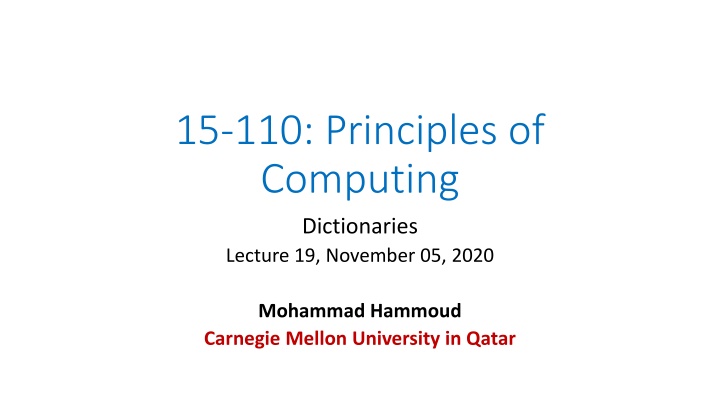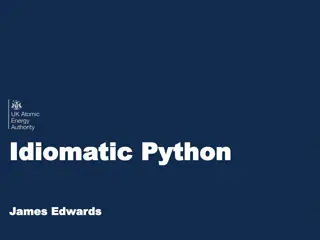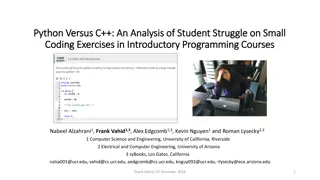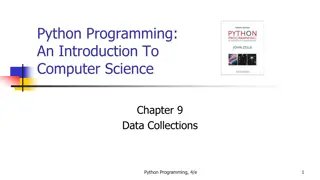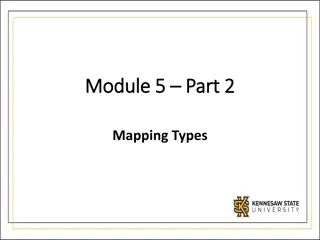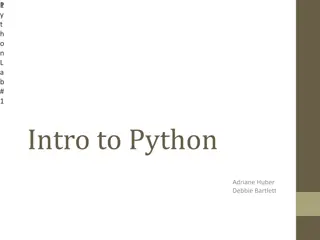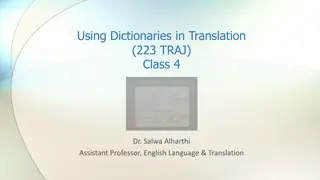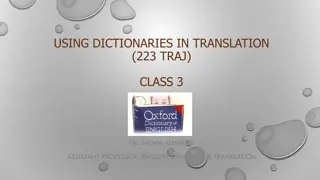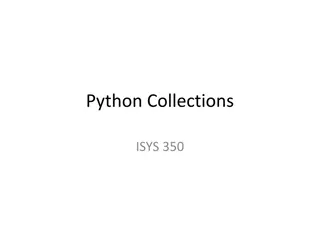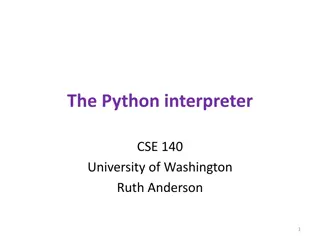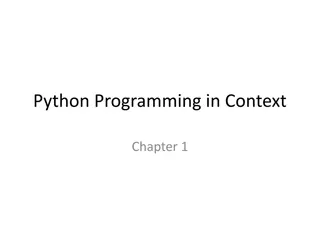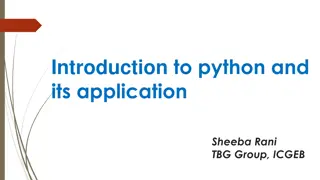Dictionaries in Python
Dictionaries in Python allow storing elements with keys of various hashable types and values of any data type. Keys must be unique, but values can be duplicated. Dictionaries cannot be concatenated but can be nested. When passed to a function, dictionaries exhibit pass-by-reference behavior due to their mutable nature.
Uploaded on Jul 16, 2024 | 4 Views
Download Presentation

Please find below an Image/Link to download the presentation.
The content on the website is provided AS IS for your information and personal use only. It may not be sold, licensed, or shared on other websites without obtaining consent from the author.If you encounter any issues during the download, it is possible that the publisher has removed the file from their server.
You are allowed to download the files provided on this website for personal or commercial use, subject to the condition that they are used lawfully. All files are the property of their respective owners.
The content on the website is provided AS IS for your information and personal use only. It may not be sold, licensed, or shared on other websites without obtaining consent from the author.
E N D
Presentation Transcript
15-110: Principles of Computing Dictionaries Lecture 19, November 05, 2020 Mohammad Hammoud Carnegie Mellon University in Qatar
Towards Dictionaries Lists, tuples, and strings hold elements with only integer indices 45 Coding 4.5 7 89 0 1 2 3 4 Integer Indices In essence, each element has an index (or a key) which can only be an integer, and a value which can be of any type (e.g., in the above list/tuple, the first element has key 0 and value 45) What if we want to store elements with non-integer indices (or keys)?
Dictionaries In Python, you can use a dictionary to store elements with keys of any hashable types (e.g., integers, floats, Booleans, strings, and tuples; but not lists and dictionaries themselves) and values of any types 45 Coding 4.5 7 89 NUM 1000 2000 3.4 XXX keys of different types Values of different types The above dictionary can be defined in Python as follows: dic = {"NUM":45, 1000:"coding", 2000:4.5, 3.4:7, "XXX":89} key value Each element is a key:value pair, and elements are separated by commas
Dictionaries To summarize, dictionaries: Can contain any and different types of elements (i.e., hashable keys & values) Can contain only unique keys but duplicate values dic2 = {"a":1, "a":2, "b":2} print(dic2) Output: {'a': 2, 'b': 2} The element a :2 will override the element a :1 because only ONE element can have key a Can be indexed but only through keys (i.e., dic2[ a ] will return 1 but dic2[0] will return an error since there is no element with key 0 in dic2)
Dictionaries To summarize, dictionaries: CANNOT be concatenated Can be nested (e.g., d = {"first":{1:1}, "second":{2:"a"}} Can be passed to a function and will result in a pass-by-reference and not pass-by-value behavior since they are mutable (similar to lists) def func1(d): d["first"] = [1, 2, 3] Output: {'first': {1: 1}, 'second': {2: 'a'}} {'first': [1, 2, 3], 'second': {2: 'a'}} dic = {"first":{1:1}, "second":{2:"a"}} print(dic) func1(dic) print(dic)
Dictionaries To summarize, dictionaries: Can be iterated or looped over dic = {"first": 1, "second": 2, "third": 3} for i in dic: print(i) first second third ONLY the keys will be returned. Output: How to get the values?
Dictionaries To summarize, dictionaries: Can be iterated or looped over dic = {"first": 1, "second": 2, "third": 3} for i in dic: print(dic[i]) 1 2 3 Values can be accessed via indexing! Output:
Adding Elements to a Dictionary How to add elements to a dictionary? By indexing the dictionary via a key and assigning a corresponding value dic = {"first": 1, "second": 2, "third": 3} print(dic) dic["fourth"] = 4 print(dic) {'first': 1, 'second': 2, 'third': 3} {'first': 1, 'second': 2, 'third': 3, 'fourth': 4} Output:
Adding Elements to a Dictionary How to add elements to a dictionary? By indexing the dictionary via a key and assigning a corresponding value dic = {"first": 1, "second": 2, "third": 3} print(dic) dic[ second"] = 4 print(dic) If the key already exists, the value will be overridden {'first': 1, 'second': 2, 'third': 3} {'first': 1, 'second : 4, 'third': 3} Output:
Deleting Elements to a Dictionary How to delete elements in a dictionary? By using del dic = {"first": 1, "second": 2, "third": 3} print(dic) dic["fourth"] = 4 print(dic) del dic["first"] print(dic) Output: {'first': 1, 'second': 2, 'third': 3} {'first': 1, 'second': 2, 'third': 3, 'fourth': 4} {'second': 2, 'third': 3, 'fourth': 4}
Deleting Elements to a Dictionary How to delete elements in a dictionary? Or by using the function pop(key) dic = {"first": 1, "second": 2, "third": 3} print(dic) dic["fourth"] = 4 print(dic) dic.pop( first ) print(dic) Output: {'first': 1, 'second': 2, 'third': 3} {'first': 1, 'second': 2, 'third': 3, 'fourth': 4} {'second': 2, 'third': 3, 'fourth': 4}
Dictionary Functions Many other functions can also be used with dictionaries Function Description dic.clear() dic.copy() dic.items() Removes all the elements from dictionary dic Returns a copy of dictionary dic Returns a list containing a tuple for each key-value pair in dictionary dic dic.get(k) dic.keys() Returns the value of the specified key k from dictionary dic Returns a list containing all the keys of dictionary dic dic.pop(k) Removes the element with the specified key k from dictionary dic
Dictionary Functions Many other functions can also be used with dictionaries Function Description dic.popitem() dic.values() Removes the last inserted key-value pair in dictionary dic Returns a list of all the values in dictionary dic
Next Lecture Problem Solving
